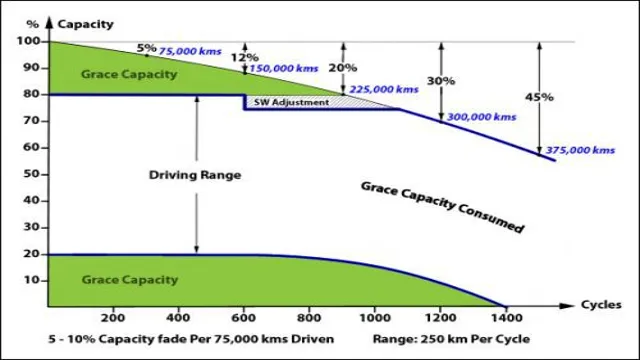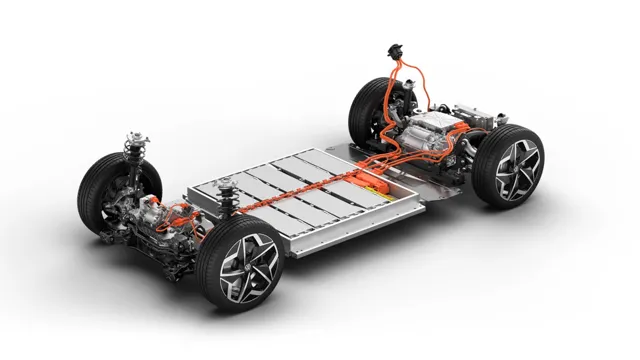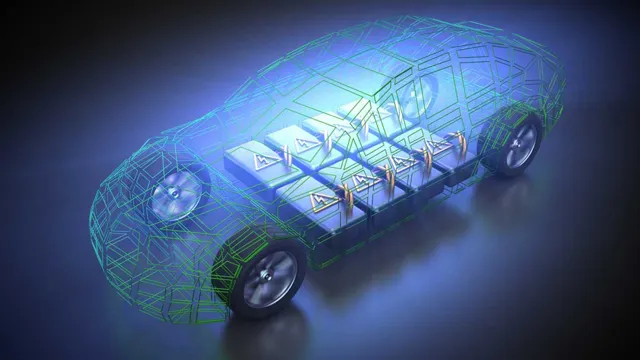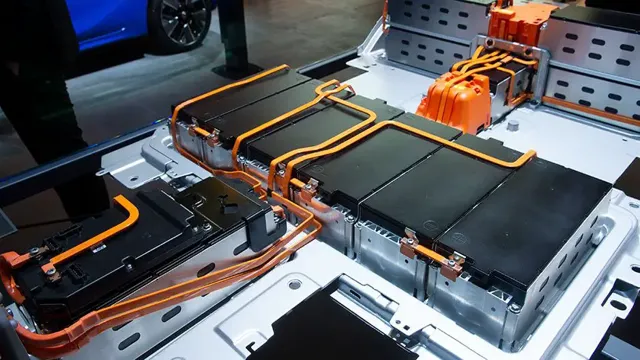Uncovering the Truth Behind Electric Car Battery Time: How to Maximize Your EV’s Performance
Electric cars are the future of the automotive industry. They are eco-friendly, cost-efficient, and have various benefits that gasoline-powered vehicles cannot compete with. However, one common question that always comes to mind when contemplating purchasing an electric car is, “How long do electric car batteries last?” The answer to this question is not simple, as it depends on many factors.
One’s driving habits, the model and make of the car, and the condition of the battery are all significant influences on an electric car battery’s lifespan. However, on average, an electric car battery can last anywhere from five to twenty years, with the typical time being around eight to ten years. The lifespan of an electric car battery doesn’t necessarily refer to how long it can hold a charge; rather, it refers to the decline in its overall capacity.
The more one uses their electric car, the more the battery capacity decreases, just like how a phone battery loses its holding power over time. Thus, overall, one can expect an electric car battery to last for a considerable amount of time. This means that purchasing an electric car is a wise and long-term investment that benefits both the environment and one’s pocketbook.
With the advancement of technology and the continuous improvements observed in battery technology, the future of electric cars is becoming even brighter.
The Basics of Electric Car Batteries
One of the most pressing concerns when it comes to electric cars is the electric car battery time. This refers to the amount of time that an electric car on a single charge before it needs to be recharged. Different models of electric cars have different battery times, ranging from as little as 80 miles to as much as 300 miles.
While this may be a cause for concern for some drivers, it’s important to remember that electric cars are still a relatively new technology and that advancements are being made all the time. Additionally, many electric car charging stations are popping up in cities around the globe, making it easier than ever to keep your car charged and ready to go.
Understanding Battery Capacity and Range
Electric car batteries are the heart and soul of electric vehicles, and understanding their capacity and range is crucial to making informed decisions about which model to purchase. Capacity refers to the amount of energy an electric car battery can store, and it is typically measured in kilowatt-hours (kWh). The higher the battery capacity, the farther an electric car can travel on a single charge.
Range is simply the distance an electric car can travel on a full charge, and it depends on several factors, including the vehicle’s battery capacity, driving style, weather conditions, and terrain. Generally, the more powerful the battery, the longer the range. So, when deciding which electric car to buy, it’s essential to consider both the battery capacity and the range to ensure that the vehicle meets your specific needs.

Factors That Impact Electric Car Battery Life
Electric car batteries have become an essential aspect of modern-day electric cars. These batteries are responsible for storing energy to power your vehicle’s electric motor. The most common type of electric car battery is the lithium-ion battery, which is known for its high energy density, long lifespan, and excellent performance.
The battery’s performance and lifetime can be impacted by several factors, such as temperature, usage patterns, and charging habits. For instance, extreme temperatures can cause the battery to degrade faster, while frequent fast charging can reduce its lifespan. Maintaining appropriate charging levels is essential to ensure the longevity of the battery.
Therefore, it is crucial to educate yourself on the dos and don’ts of electric car battery usage to maximize its lifespan and get the most out of your electric vehicle.
How Long Do Most Electric Car Batteries Last?
If you’re thinking about investing in an electric car, the lifespan of its battery is likely a major concern. The longevity of electric car batteries is affected by diverse factors, including usage patterns, quality of the battery cells, temperature, and overall maintenance. Typically, electric car batteries can last from 8 to 10 years on average, or up to 200,000 miles before they need to be replaced.
However, some electric car battery models can last up to 20 years or more, depending on the quality and manufacturer. While the upfront cost of an electric car is often higher than that of traditional gasoline vehicles, you’ll end up saving money over time because of reduced fuel and maintenance costs. With federal and state incentives, as well as increased availability of public charging stations, electric cars are becoming more popular than ever.
So why not make the switch, reduce your carbon footprint, and enjoy all the benefits electric cars have to offer?
Statistical Data on Battery Lifespan
Electric car batteries have been continuously evolving, and most modern-day batteries last around 100,000 miles before needing to be replaced. However, the lifespan of an electric car battery depends on various factors such as the make and model of the vehicle, the type of battery used, and the climatic conditions it is operated in. For example, Tesla’s Model S and Model X have some of the best performing batteries, lasting up to 300,000 miles before showing signs of significant reduction in performance.
On the other hand, cheaper electric cars may have weaker batteries that can last up to 60,000 miles before requiring replacement. With advancements in battery technology, it is predicted that the lifespan of electric car batteries will only improve in the future, further cementing electric cars as a viable alternative to conventional vehicles.
Electric Car Battery Warranties
When it comes to electric cars, one of the main concerns for potential buyers is the lifespan of the battery. So, how long do most electric car batteries last? Well, it depends on a few factors, including how frequently the car is driven, how it is charged, and the type of battery. Most electric car batteries are expected to last for around 100,000 miles, with some higher-end models boasting a lifespan of up to 200,000 miles.
However, it’s important to note that the lifespan of the battery also depends on the manufacturer’s warranty. Many electric car manufacturers offer warranties ranging from 8-10 years or 100,000 to 150,000 miles, whichever comes first. This means that if the battery in your electric car fails within the warranty period, the manufacturer will replace it free of charge.
However, it’s crucial to read the fine print of your warranty to ensure that you understand the terms and conditions, as some warranties may not cover certain types of battery degradation. In conclusion, most electric car batteries are expected to last for around 100,000 miles, but it’s important to consider the manufacturer’s warranty when making a purchasing decision. With proper care and maintenance, an electric car battery can have a long lifespan, providing peace of mind and saving you money in the long run.
So, if you’re thinking about switching to an electric car, be sure to do your research and choose a model with a reliable battery and a comprehensive warranty.
Tips for Maximizing Electric Car Battery Life
Electric car battery life is an important factor to consider when purchasing an electric car. On average, most electric car batteries last around 10 years, or about 100,000 miles, before needing a replacement. However, there are certain steps you can take to maximize the life of your electric car battery.
One tip is to avoid frequent fast charging, as this can cause your battery to degrade faster. Instead, try to use slower charging options whenever possible. Additionally, keeping your electric car battery between 20% and 80% charged can also help extend its lifespan.
Another important factor is to avoid exposing your battery to extreme temperatures, such as leaving your car in the hot sun for extended periods of time. By following these tips, you can help maximize the life of your electric car battery and enjoy a longer-lasting vehicle.
The Future of Electric Car Batteries
The future of electric car batteries looks bright, as new technologies are being developed to increase their lifespan and performance. Electric car battery time is an important consideration for consumers, as a longer battery life means fewer trips to the charging station and a more convenient driving experience. One promising technology is the solid-state battery, which uses a solid electrolyte instead of a liquid one.
This makes the battery safer, more efficient, and able to hold more charge. Another development is silicon anodes, which can increase the energy density of batteries and reduce charging time. The next generation of electric car batteries is also expected to be more sustainable, with materials that are easier to recycle and reuse.
As electric vehicles become more mainstream, these advancements will be vital in improving the performance and reliability of their batteries, and helping to reduce our reliance on fossil fuels. With these new innovations, electric car battery time may soon no longer be a concern for drivers.
Advancements in Battery Technology
Advancements in battery technology have transformed the electric car industry, making it more accessible and practical for everyday use. The future of electric car batteries looks promising as companies are investing heavily in research and development to create high-performance batteries that are affordable and long-lasting. Lithium-ion batteries have been the standard for electric cars, but there are new innovations in solid-state batteries and solid-state electrolytes that promise to revolutionize the industry.
These new developments aim to increase energy density, reduce charging time, and lower costs. The emergence of these technologies will not only benefit electric cars but all electronic devices that rely on batteries. It is encouraging to see how battery technology is evolving, and it is exciting to imagine what the future holds for electric cars.
With these advancements, we are inching closer towards a more sustainable and eco-friendly future, and the potential impact on the environment is immeasurable.
The Impact of Solid-State Batteries on Electric Cars
Solid-State Batteries The invention of solid-state batteries has brought forth a new era for electric car batteries. Compared to traditional lithium-ion batteries, solid-state batteries are safer, more efficient, and have a higher energy density. These batteries use a solid electrolyte instead of a liquid one, eliminating the risk of leaks and fire hazards.
They also allow for faster charging times, longer driving ranges, and are more environmentally friendly. With the increasing demand for electric cars, solid-state batteries will have a significant impact on the automotive industry, improving the performance and reducing the cost of electric vehicles. Furthermore, they could potentially replace the current lithium-ion batteries in the future, paving the way for a more sustainable and energy-efficient mode of transportation.
The development of solid-state batteries is still in its early stages, but the future looks bright for electric car batteries with this promising new technology.
Final Thoughts
In conclusion, the electric car battery time is a crucial factor to consider when making the transition to electric vehicles. While advancements have been made in battery technology, there is still room for improvement. Factors such as driving habits, weather conditions, and vehicle type can all affect the battery life of an electric car.
It is important to research and understand the range and charging options of each vehicle before making a purchase. However, with the growing demand for sustainable transportation and the continued development of battery technology, it is likely that we will see longer battery life and improved charging infrastructure in the near future. By embracing electric cars, we can reduce our carbon footprint and drive towards a more sustainable future.
Conclusion
In conclusion, electric car battery time may seem like the biggest hurdle for the widespread adoption of electric vehicles, but it’s important to remember that Rome wasn’t built in a day. With advancements in technology, increased investment, and a shift in societal attitudes towards sustainability, we are well on our way towards a future where electric cars reign supreme. So buckle up, charge up, and get ready for an exciting ride into the future of transportation!”
FAQs
How long does an electric car battery last on a single charge?
The battery life of an electric car varies based on the make and model, but on average, it can last anywhere from 100 to 300 miles on a single charge.
Can I charge my electric car at home?
Yes, you can charge your electric car at home with a Level 2 charging station that you can install in your garage or outside your house.
How long does it take to charge an electric car battery?
The time it takes to charge an electric car battery depends on the type of charger you are using and the battery capacity of your car. A Level 1 charger can take up to 24 hours to fully charge a battery, while a Level 2 charger takes around 4-8 hours. A fast charging station can charge a battery up to 80% capacity in 30 minutes.
What factors affect the battery life of an electric car?
The battery life of an electric car can be affected by several factors, including temperature, driving habits, battery age, and charging frequency. Cold weather and fast driving can drain the battery faster, while regular charging and proper maintenance can extend its life.






